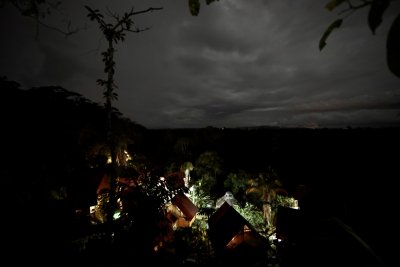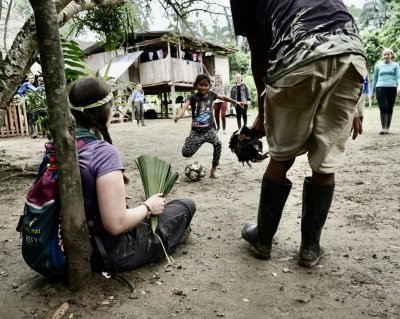Postcards from Ecuador: The Amazon delivers sights and sounds of the jungle and a sense of culture and community
Days five through seven of the Honors College study abroad trip to Ecuador saw the group not only descend 8,000 feet from the high plateau of Quito, but wholeheartedly plunge into a fully immersive experience in the Amazon basin in a way that few on the trip will ever forget.
Day five was a long day on the “Night Bus,” as the students have taken to calling the vehicle because of the amazing ability of its driver, Alejandro (quickly becoming a figure of a legend among the students and staff) to fit the bus and to seemingly impossible places.
The cool, low humidity days of Quito were clearly behind the group as it exited the bus into the thick blanket of heat and humidity on the Rio Napo, one of Ecuador‘s largest tributaries of the mighty Amazon.
At the river’s edge, the group met its guides, Fausto and Rolando, members of the local Kichwa community who would for the next two days shepherd the students through the experiences of the Indigenous culture of the Rio Napo.
The 20-minute ride by motorized canoe as the sun dipped below the Andes ended at the Yacuma Eco-Lodge, and after dropping off bags and having a delicious dinner at the lodge, headlamps were donned for one of the program’s highlights to date: a nighttime walk of the lodge’s grounds to see frogs, insects, spiders, and even a four foot-long boa constrictor. The jungle explodes in sounds and activity at night, and many students expressed how they enjoyed simply sitting in their dark bedrooms and listening to the sounds of the jungle.
“This is so incredible,” said Adrienne Rugg, an English major from Santa Fe, New Mexico, as she perched with her phone inches over a huge green katydid that blended seamlessly with its leafy background.
Cries of “tarantula!” brought the group together at the sight of a huge, furry spider as big as a coffee saucer.
“Niño,” replied Rolando to the astounded students.
That night it rained sheets, probably in a way it can only rain in the Amazon, and the rivers were high and muddy with the rain continuing through the next morning. Undeterred, the students took a guided jungle walk, learning about the names and uses for many flora and fauna, from “walking palms” to the kind of shrubs that host the tasty lemon ant, a Kichwa staple for a quick hit of protein when foraging in the jungle.
Other activities at the lodge included gold panning in the Rio Napo, an afternoon bird walk that included parrots and squirrel monkeys, fishing for piranha (four were caught) and tubing.
But the group seemed to agree that the most impactful single activity was a short hike to a local Kichwa community, where the students were introduced to a family who shared with the group what life was like in Kichwa villages across the Amazon.
Farmers of such staples as yuca, corn, papaya, plantain, and cacao, the family opened their doors to the group and led demonstrations on cooking, local food, preparing chicha – a local fermented drink that varies from community to community – and the Kichwa art of hunting with a blow gun.
A spirited pick-up soccer game involving the students, local children, and the guides was the highlight of the day, as gales of genuine laughter and shared joy brought the students even closer to the community and its people.
“The language barrier just totally broke down,” said Samantha Herlich, an environmental studies major from Pleasanton, California. “We just laughed and communicated together so easily.”
The group’s guides proved to be crucial in not only connecting the class to the incredible biodiversity of the region, but more importantly, its inhabitants.
“Without our guides, we wouldn’t have known anything about this amazing place. They didn’t just give us a series of lessons, they immersed us in their culture firsthand, which was so much more impactful,“ said Jessica Dietzman, a business and sustainability major from Sequim.
Environmental science student Amelia Bourne, who hails from Northampton, Massachusetts, agreed with Dietzman.
“The relationship between our guides and the nature around them, and how closely they are tied to that environment as a way of life, was just amazing,” Bourne said.
After an early breakfast Monday morning it was time to depart via the canoes and once again board the Night Bus for the next leg of the trip, this time to Baños.
Climbing slowly out of the Amazon and back into the cloud forest, the students pondered how they could be surrounded by some of the most primeval jungle on the planet but their most impactful memories would be of Fausto, Rolando, the village children, and an impromptu soccer game.

